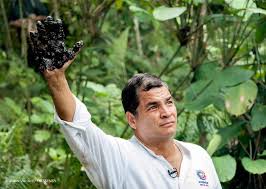Basis to support Ecuador in its fight against the transnational Chevron
The U.S. multinational company Chevron has launched a campaign against Ecuador and those affected by the pollution caused by its operations in the Ecuadorian Amazon. Millions of dollars are paying for lawyers and advertising media, with legal proceedings of all types and in different places. It is the counterclaim for the judgment that convicted the transnational to pay compensation for the ecological disaster it produced.
From 1964 to 1992 the oil company Texaco (bought by Chevron in 2001) dealt with the extraction of oil in Ecuadorian Amazon. In that period it poured 80,000 tons of oil-related waste, 85 times the disaster caused by British Petroleum in the Gulf of Mexico.
According to international experts, the environmental disaster in the area has caused the death of over a thousand people, affected by cancer, the disappearance of two ancestral peoples (the Tetetes and the Sansaguaris) and the migration of the Cofan, Siona and Sequoia communities as well as serious diseases in livestock and fish of that Amazonian region. In sum, it has caused serious damage to the environment and human rights.
In 1993, 88 indigenous people, victims of the ecological tragedy, sued Texaco in U.S. courts, which declared themselves incompetent. So, the legal dispute was taken to Ecuador. The company was very pleased that the conflict was to be resolved in Ecuador, as its power and influence networks were evident.
However, in 2011, a court of first instance of Ecuador issued a judgment that Chevron-Texaco should compensate communities affected by the larceny, which was subsequently ratified by the National Court of Justice of Ecuador. The sum ultimately to be paid is US$9.510 million.
The company did not accept the judgment or court proceedings and launched a countersuit, using all the mechanisms of Global Corporate Law to further its interests. Undoubtedly, it rejected the national sovereignty of Ecuador, which it had originally accepted for the trial. Its current effort aims to take advantage of an asymmetric international legal system which favours transnationals’ interests.
It is well known that systems of arbitration under bilateral or regional trade agreements and investments place, in fact, transnational companies (TNCs) above the rights of the majority of society. And multinationals consistently benefit from the mechanisms of conflict resolution in arbitration courts and failure to comply can result in very harsh economic consequences for the affected countries and communities.
So, Chevron-Texaco has decided to use the bilateral investment protection treaty between the U.S. and Ecuador, which came into force in 1997, to denounce this country before the Permanent Court of Arbitration at The Hague. However, here there are two surprising facts: first, the failure of the principle of retroactivity, since the treaty entered into force five years after Texaco left the country, and second, it was not the State of Ecuador that sued the multinational but the affected communities, so the bilateral treaty should not have been activated in any case. The arbitration decision is still pending.
Moreover, Chevron also sued the legal representatives of the complainant’s communities in the New York’s Federal Court in 2010 for criminal association, arguing blackmail against the oil company. The multinational further demands that the government of Ecuador should be the one responsible for paying the compensation it has been condemned to by the Ecuadorian court.
Chevron is staunchly defended by the transnational’s country of origin and ultimately, the legal war against Ecuador is based on the defense of a radically unjust international legal-economic order.
The case of Chevron makes clear how TNCs become powerful agents whose predatory drive is no different to that used by similar companies in other countries. At the same time, the global legal architecture is responsible for supporting such actions to the detriment of economic and socio-environmental conditions of the countries where they operate.
Chevron-Texaco should comply with the judgment, pay the corresponding compensation and subject itself to Ecuador’s laws. Moreover, an international treaty is essential for the control of transnational corporations within the United Nations framework, to end impunity for their operations in developing countries.
Supporting Ecuador to defend against the attacks of transnationals and advance the regional integration
We have formed a Support Network for Ecuador so that “Chevron’s dirty hand” answers for the deterioration of the environment in the Amazon and the severely affected communities.
Our commitment to Ecuador is both part of the struggle of the Chilean people to stop the irresponsible behavior of transnational in the areas of fisheries, mining, production of cellulose, and electricity. Cases such as Barrick Gold in the north and Hidroaysén in Patagonia are paradigmatic of transnational attacks on the fundamental human rights of local communities. At the same time, pressure on the political powers to approve projects have revealed the weakness of Chilean institutions, which could only be countered by the force of the social movements.
The Chevron case should become the benchmark for all Latin American countries to define a common policy towards foreign capital, and to become an essential component of our regional integration. We must end the fatal error that has led us to compete between brothers to bring to Latin America capitals that have been, many times, predators in the exploitation of our natural resources and have done serious injury to the environment and human rights.
Finally, we propose that Chile’s Parliament and Government speak out in solidarity with the Ecuadoran government against Chevron’s aggression. It is also time for both governments to propose in CELAC [Centre of Latin American Studies, Spanish acronym], the development of a common regulation policy against TNCs. Such regulation should contain the same treatment for each of the countries of the region in collecting royalties, labour relations, environmental standards, transfer pricing, among some of the aspects to be considered.
Signed for the Network: Roberto Pizarro, Tomás Hirsch, Coral Pey, Salvador Muñoz, Flavia Liberona, Patricia Morales y Pía Figueroa.






